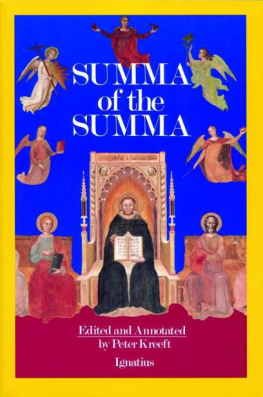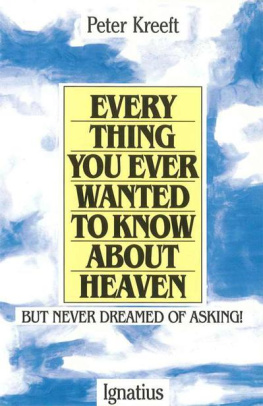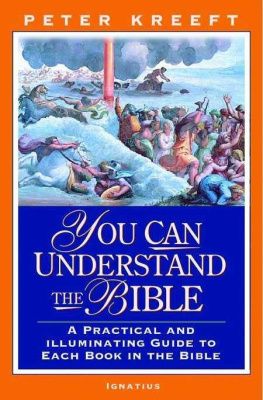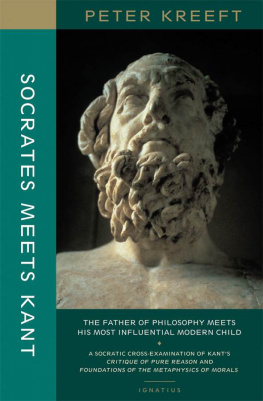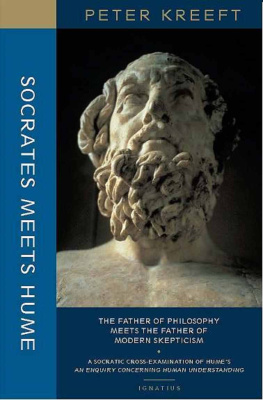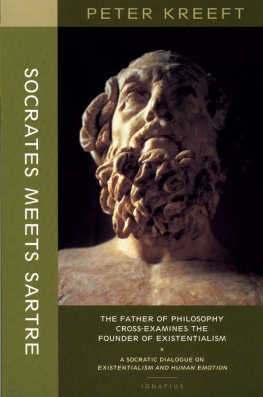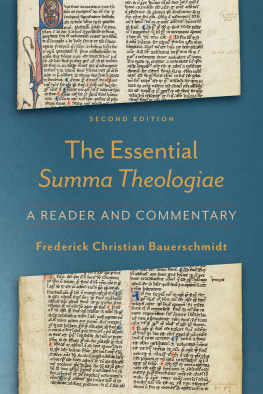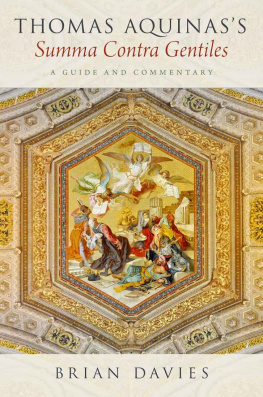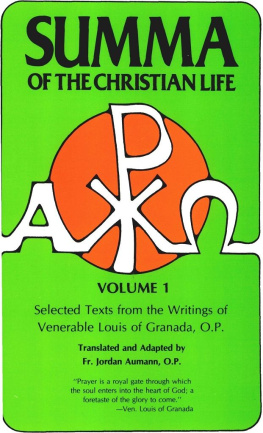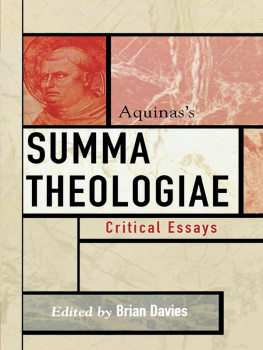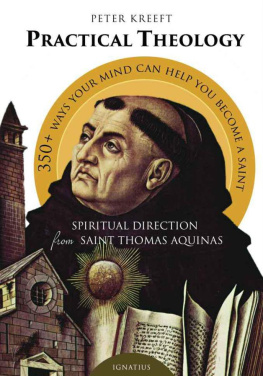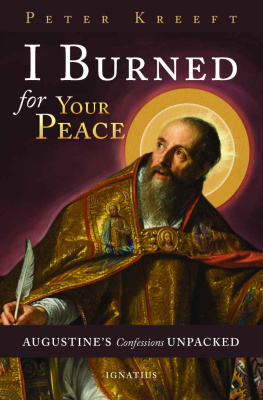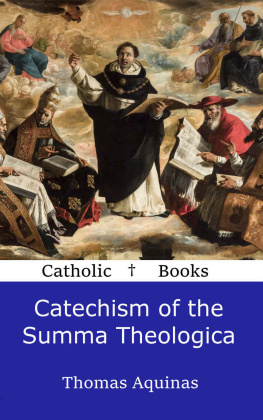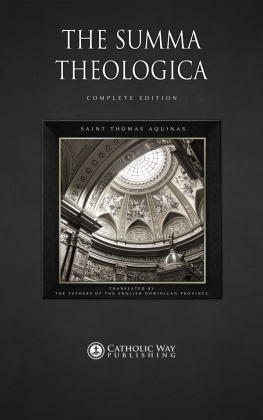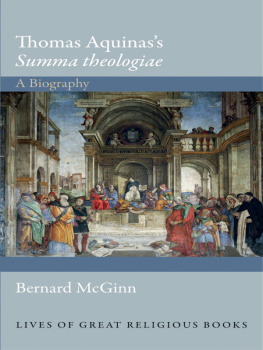Peter Kreeft - A Summa of the Summa
Here you can read online Peter Kreeft - A Summa of the Summa full text of the book (entire story) in english for free. Download pdf and epub, get meaning, cover and reviews about this ebook. year: 1990, publisher: Ignatius Press, genre: Science. Description of the work, (preface) as well as reviews are available. Best literature library LitArk.com created for fans of good reading and offers a wide selection of genres:
Romance novel
Science fiction
Adventure
Detective
Science
History
Home and family
Prose
Art
Politics
Computer
Non-fiction
Religion
Business
Children
Humor
Choose a favorite category and find really read worthwhile books. Enjoy immersion in the world of imagination, feel the emotions of the characters or learn something new for yourself, make an fascinating discovery.
- Book:A Summa of the Summa
- Author:
- Publisher:Ignatius Press
- Genre:
- Year:1990
- Rating:5 / 5
- Favourites:Add to favourites
- Your mark:
- 100
- 1
- 2
- 3
- 4
- 5
A Summa of the Summa: summary, description and annotation
We offer to read an annotation, description, summary or preface (depends on what the author of the book "A Summa of the Summa" wrote himself). If you haven't found the necessary information about the book — write in the comments, we will try to find it.
Peter Kreeft: author's other books
Who wrote A Summa of the Summa? Find out the surname, the name of the author of the book and a list of all author's works by series.
A Summa of the Summa — read online for free the complete book (whole text) full work
Below is the text of the book, divided by pages. System saving the place of the last page read, allows you to conveniently read the book "A Summa of the Summa" online for free, without having to search again every time where you left off. Put a bookmark, and you can go to the page where you finished reading at any time.
Font size:
Interval:
Bookmark:
A Summa of the Summa
PETER KREEFT
of the Summa
The Essential Philosophical Passages of St. Thomas Aquinas Summa Theologica Edited and Explained for Beginners
IGNATIUS PRESS SAN FRANCISCO
Passages from the Summa Theologica
are taken from the translation done in 1920 by
The Fathers of the English Dominican Province,
with permission.
Cover art credit: SCALA / Art Resource, New York
Detail of St. Thomas Aquinas from a work entitled
Trionfa di S. Tommaso dAquino
by Andrea di Buonaiuto
in the Spanish chapel of
St. Maria Novella, Florence
Cover design by Roxanne Mei Lum
1990 Ignatius Press, San Francisco
With ecclesiastical approval
All rights reserved
ISBN 9780-89870-317-7 (HB)
ISBN 9780-89870-300-9 (PB)
Library of Congress catalogue number 90-81772
Printed in the United States of America
To W. Norris Clark, S.J .
More than a great Thomist
A little Thomas
CONTENTS
Introduction
INTRODUCTION
I couldnt make any judgment on the Summa , except to say this: I read it every night before I go to bed. If my mother were to come in during the process and say, Turn off that light. Its late, I with lifted finger and broad bland beatific expression, would reply, On the contrary, I answer that the light, being eternal and limitless, cannot be turned off. Shut your eyes, or some such thing. In any case I feel I can personally guarantee that St. Thomas loved God because for the life of me I cannot help loving St. Thomas.Flannery OConnor, The Habit of BeingI. On St. Thomas
St. Thomas Aquinas is certainly one of the greatest philosophers who ever lived (to my mind he is the greatest), for at least eight reasons: truth, common sense, practicality, clarity, profundity, orthodoxy, medievalism, and modernity.
First, and most simply, he told the truththat simple and unfashionable purpose of philosophy that is so often fudged (nuanced) or forgotten today. The following quotation should be chiseled on the doorposts of every philosophy department in the world: The study of philosophy is not the study of what men have opined, but of what is the truth.
2. Descartes says that the one thing he learned about philosophy in the university that stuck with him was that one could not imagine any doctrine so bizarre or unbelievable that it has not been seriously taught by some philosopher or other. What was true already in 1637 is triply true today. St. Thomas, however, is the master of common sense. He has an uncanny knack of sniffing out the obviously right position amid a hundred wrong ones. This holds true especially in ethics, the real test of a philosopher. Some great philosophers, like Descartes, Hegel, and Heidegger, have no philosophical ethics at all. Others, like Hobbes and Hume and Kant and Nietzsche, have ethics that are simply unlivable. St. Thomas is as practical and plain and reasonable in ethics as Aristotle, or Confucius, or your uncle.
3. St. Thomas was a master of metaphysics and technical terminology; yet he was also such a practical man that as he lay dying he was talking about three things: a commentary on The Song of Songs , a treatise on aqueducts, and a dish of herring. Ordinary people, Popes, and kings wrote to him for advice and always got back sound wisdom. I know of no one since St. Paul who is so full of both theoretical and practical wisdom.
4. Those who love truth passionately usually also love simplicity and clarity of style so that as many people as possible can benefit from this precious thing, Truth. Fr. Norris Clarke, S.J. of Fordham University, the most Aquinas-like mind I know of all men living, says there are three kinds of philosophers: those who at first seem clear, but upon further readings become more and more obscure; those who at first may seem obscure but become clearer and clearer upon each reading (St. Thomas is the prime example of this kind), and those who seem obscure at first and remain obscure.
St. Thomas aimed only for light, not heat. There is almost never anything personal in the Summa , no rhetoric, no appeal to the irrational; nothing but lucidity.
5. And depthno philosopher since St. Thomas has ever so successfully combined the two fundamental ideals of philosophical writing: clarity and profundity. Continental European philosophy in this century has sought and sometimes found depth, by focusing on the truly fundamental issues, but at the expense of clarity. English philosophy has sought and often found clarity, but at the expense of depth, concentrating on second-order linguistic questions rather than on those the average person wonders at: God, man, life, death, good, and evil.
6. A sixth reason for St. Thomas greatness is decisive only for Catholics, but it should at least be decisive for all Catholics: according to the Churchs own teaching authority (and to be a Catholic means to believe in such a thing), St. Thomas is the primary theological Doctor (Teacher) of the Church. During its proceedings, the Council of Trent placed the Summa on the high altar in second place only to the Bible. Pope Leo XIII in Aeterni Patris (1879) told all Catholic teachers to restore the golden wisdom of St. Thomas... and let them clearly point out its solidity and excellence above all other teaching.
Even non-Catholics must go to St. Thomas to understand Catholic theology and philosophy. You can never understand a philosophy from its critics or dissenters. In four colleges and universities, I have never had a good course on any philosopher (including many philosophers I disagree with) from a critic, and never a worthless one from a disciple.
7. St. Thomas was crucial for the medieval era. He fulfilled more than anyone else the essential medieval program of a marriage of faith and reason, revelation and philosophy, the Biblical and the classical inheritances. In so doing, he held together for another century the medieval civilizations intellectual soul, which in his century was threatening to break up like a ship battered by huge waves of division, caused mainly by the rediscovery of the works of Aristotle and the polarization of reactions into the fearful heresy-hunting of traditionalists, and the fashionable compromising of modernists. Aquinas stands as a shining example of an alternative to both the fundamentalists and the liberals of his day and of any day.
You may not agree that St, Thomas is historys greatest philosopher, but he was certainly the greatest philosopher for the two thousand years between Aristotle and Descartes. He represents the medieval mind par excellence, and the Middle Ages are the parent and source of all the divergent streams in the modern world, like a mother whose many children went their own various ways.
Not only does St. Thomas represent a unity of ingredients that were later to separate, but also a unity of ingredients that existed separately before him. In reading St. Thomas you also meet Thales, Parmenides, Heraclitus, Socrates, Plato, Aristotle, Plotinus, Proclus, Justin, Clement, Augustine, Boethius, Dionysius, Anselm, Abelard, Albert, Maimonides, and Avicenna. For one brief, Camelot-like moment it seemed that a synthesis was possible. Our fractured world has been praying Forgive us our syntheses ever since.
8. Finally, St. Thomas is important for us today precisely because of our lack. Timeless truth is always timely, of course, but some aspects of truth are especially needed at some times, and it seems that our times badly need seven Thomistic syntheses: (1) of faith and reason, (2) of the Biblical and the classical, the Judeo-Christian and the Greco-Roman heritages, (3) of the ideals of clarity and profundity, (4) of common sense and technical sophistication, (5) of theory and practice, (6) of an understanding, intuitive vision and a demanding, accurate logic, arid (7) of the one and the many, a cosmic unity or big picture and carefully sorted out distinctions. I think it a safe judgment that no one in the entire history of human thought has ever succeeded better than St. Thomas in making not just one but all seven of these marriages which are essential to mental health and happiness.
Next pageFont size:
Interval:
Bookmark:
Similar books «A Summa of the Summa»
Look at similar books to A Summa of the Summa. We have selected literature similar in name and meaning in the hope of providing readers with more options to find new, interesting, not yet read works.
Discussion, reviews of the book A Summa of the Summa and just readers' own opinions. Leave your comments, write what you think about the work, its meaning or the main characters. Specify what exactly you liked and what you didn't like, and why you think so.

